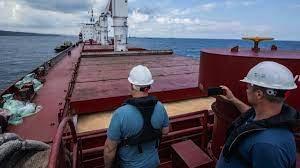 Although the Black Sea Grain Initiative (BSGI) was extended for 60 days on March 18th, shipments from Ukraine have been impeded twice by day-long cancellation of “inspection” of vessels in Turkish territorial waters. Currently, 28 vessels carrying more than a million tons of commodities are awaiting clearance.
Although the Black Sea Grain Initiative (BSGI) was extended for 60 days on March 18th, shipments from Ukraine have been impeded twice by day-long cancellation of “inspection” of vessels in Turkish territorial waters. Currently, 28 vessels carrying more than a million tons of commodities are awaiting clearance.
At issue is the concern by the Russian Federation over international sanctions. These were imposed following the February 2022 unprovoked invasion of Ukraine. Topics impacting the Russian Federation include restoration of an ammonia pipeline to allow export of fertilizer, unblocking of assets and reconnection of banks to the SWIFT payment system. The Russian Federation blames the United Nations for delays in inspection that are, in all probability, unnecessary and serve as an obstruction to trade.
 Countering accusations from Russia, a U.N. spokesman noted higher grain trade, lower freight rates and insurance as a result of the BSGI. These contentions are only valid if the agreement functions over the long term with both propositions in question.
Countering accusations from Russia, a U.N. spokesman noted higher grain trade, lower freight rates and insurance as a result of the BSGI. These contentions are only valid if the agreement functions over the long term with both propositions in question.
Continued exports of commodities from Ukraine are necessary for that Nation’s survival. Obstruction in implementation of the BSGI, shelling of port installations and occupation of twenty percent of the agricultural area belonging to Ukraine will reduce World supplies of grains and oilseeds and ultimately, increase the cost of feed ingredients to U.S. farmers.